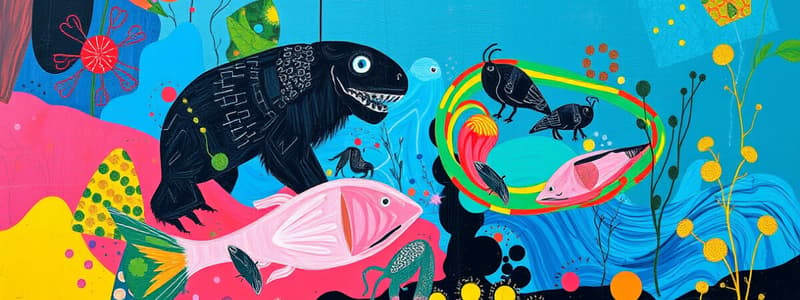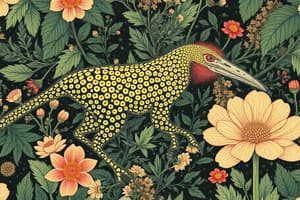Podcast
Questions and Answers
What are r-selected species known for?
What are r-selected species known for?
- High rate of population growth (correct)
- Long lifespan
- Few offspring
- High parental care
What happens to r-selected species due to the lack of parental care?
What happens to r-selected species due to the lack of parental care?
Many offspring die at a young age.
What do r-selected species do to sustain their species?
What do r-selected species do to sustain their species?
Produce a large number of offspring.
What are examples of r-selected species?
What are examples of r-selected species?
What do r-selected species tend to be?
What do r-selected species tend to be?
What does opportunistic mean?
What does opportunistic mean?
Are r-selected species regular?
Are r-selected species regular?
What are K-selected species known for?
What are K-selected species known for?
Where do K-selected species typically develop?
Where do K-selected species typically develop?
What happens after birth for K-selected species?
What happens after birth for K-selected species?
Where do K-selected species tend to be near?
Where do K-selected species tend to be near?
What are examples of carrying capacity?
What are examples of carrying capacity?
Is competition for resources in K-selected species habitats relatively high?
Is competition for resources in K-selected species habitats relatively high?
Is competition for resources in R-selected species habitats relatively high?
Is competition for resources in R-selected species habitats relatively high?
Do K-selected species live in disturbed environments?
Do K-selected species live in disturbed environments?
Do R-selected species live in disturbed environments?
Do R-selected species live in disturbed environments?
What is biotic potential?
What is biotic potential?
Do r-selected species tend to be generalists or specialists?
Do r-selected species tend to be generalists or specialists?
Do K-selected species tend to be generalists or specialists?
Do K-selected species tend to be generalists or specialists?
What should classifying species be thought of as?
What should classifying species be thought of as?
Explain why most invasive species are r-selected species.
Explain why most invasive species are r-selected species.
What is the result of having a high reproductive potential for r-selected species?
What is the result of having a high reproductive potential for r-selected species?
Explain why K-selected species are typically more adversely affected by invasive species than r-selected species.
Explain why K-selected species are typically more adversely affected by invasive species than r-selected species.
Study Notes
r-selected Species
- Characterized by high rates of population growth.
- Feature short life spans and numerous small offspring with minimal to no parental care.
- Many offspring die young due to lack of nurturing.
- Sustain species by producing a large number of offspring.
- Notable examples include algae, bacteria, frogs, most insects, and many fish.
- Tend to be opportunistic, reproducing when conditions are favorable.
- Exhibit irregular population patterns.
- Generally classified as generalists, adapting to various environments.
- Invasive species, often r-selected, thrive due to high reproductive potential and quick maturation, easily colonizing new areas and competing with native species.
K-selected Species
- Typically reproduce later in life with fewer offspring, resulting in longer life spans.
- Offspring develop safely inside mothers and are born large.
- After birth, offspring mature slowly, receiving care and protection from one or both parents.
- Often found near carrying capacity, balancing population with resource availability.
- Examples include most mammals, elephants, whales, birds of prey, and long-lived plants.
- Experience high competition for resources within their habitats, reflecting their specialized nature.
- Classified as specialists, adapted to specific niches.
Comparison of r and K-selected Species
- r-selected species thrive in disturbed environments, whereas K-selected species do not.
- Competition for resources is relatively low for r-selected species but high for K-selected species.
- K-selected species are more adversely affected by invasives due to being specialists with low population growth rates, while r-selected species can switch resources, minimizing competition impacts.
- Classifying species should be viewed as a spectrum rather than strict categories.
Biotic Potential
- Refers to the maximum reproduction rate of a population under ideal conditions, influencing species' survival and adaptability.
Studying That Suits You
Use AI to generate personalized quizzes and flashcards to suit your learning preferences.
Description
This quiz explores the characteristics of r-selected and K-selected species, highlighting their reproductive strategies, life spans, and population dynamics. Learn about the adaptations that enable r-selected species to thrive in varying environments, as well as the nurturing tendencies of K-selected species. Test your knowledge on these fundamental ecological concepts.




